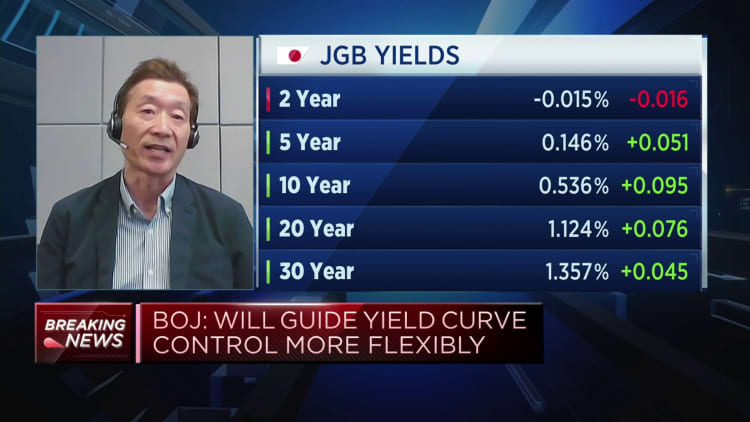The Bank of Japan headquarters in Tokyo.
Bloomberg | Getty Images
The Bank of Japan announced Friday “greater flexibility” in its monetary policy — surprising global financial markets.
The central bank loosened its yield curve control — or YCC — in an unexpected move with wide-ranging ramifications. It sent the yen whipsawing against the dollar, while Japanese stocks and government bond prices slid.
Elsewhere, the Stoxx 600 in Europe opened lower and government bond yields in the region jumped. On Thursday, ahead of the Bank of Japan statement, reports that the central bank was going to discuss its yield curve control policy also contributed to a lower close on the S&P 500 and the Nasdaq, according to some strategists.
“We didn’t expect this kind of tweak this time,” Shigeto Nagai, head of Japan economics at Oxford Economics, told CNBC’s “Capital Connection.”
Why it matters
The Bank of Japan has been dovish for years, but its move to introduce flexibility into its until-now strict yield curve control has left economists wondering whether a more substantial change is on the horizon.
The yield curve control is a long-term policy that sees the central bank target an interest rate, and then buy and sell bonds as necessary to achieve that target. It currently targets a 0% yield on the 10-year government bond with the aim of stimulating the Japanese economy, which has struggled for many years with disinflation.
In its policy statement, the BOJ said it will continue to allow 10-year Japanese government bond yields to fluctuate within the range of 0.5 percentage point either side of its 0% target — but it will offer to purchase 10-year JGBs at 1% through fixed-rate operations. This effectively expands its tolerance by a further 50 basis points.

“While maintaining the tolerance band for the 10-year JGB yield target at +/-0.50ppt, the BoJ will allow more fluctuation in yields beyond the band,” economists from Capital Economics said.
“Their aim is to enhance the sustainability of the current easing framework in a forward-looking manner. Highlighting ‘extremely high uncertainties’ in the inflation outlook, the BoJ argues that strictly capping yields will hamper bond market functioning and increase market volatility when upside risks materialize.”
Next step tightening?
From a market perspective, investors — many of whom were not expecting this move — were left wondering whether this is a mere technical adjustment, or the start of a more significant tightening cycle. Central banks tighten monetary policy when inflation is high, as demonstrated by the U.S. Federal Reserve’s and European Central Bank’s rate hikes over the past year.
“Fighting inflation was not the official reason for the policy tweak, as that would surely imply stronger tightening moves, but the Bank recognised obstinately elevated inflationary pressure by revising up its forecast,” Duncan Wrigley, chief China+ economist at Pantheon Macroeconomics, said in a note.
The BOJ said core consumer inflation, excluding fresh food, will reach 2.5% in the fiscal year to March, up from a previous estimate of 1.8%. It added that there are upside risks to the forecast, meaning inflation could increase more than expected.
Kazuo Ueda, governor of the Bank of Japan (BOJ).
Bloomberg | Bloomberg | Getty Images
Speaking at a news conference after the announcement, BOJ Governor Kazuo Ueda played down the move to loosen its yield curve control. When asked if the central bank had shifted from dovish to neutral, he said: “That’s not the case. By making YCC more flexible, we enhanced the sustainability of our policy. So, this was a step to heighten the chance of sustainably achieving our price target,” according to a Reuters translation.
MUFG said that Friday’s “flexibility” tweak shows the central bank is not yet ready to end this policy measure.
“Governor Ueda described today’s move as enhancing the sustainability of monetary easing rather than tightening. It sends a signal that the BoJ is not yet ready to tighten monetary policy through raising interest rates,” the bank’s analysts said in a note.
Capital Economics’ economists highlighted the importance of inflation figures looking ahead. “The longer inflation stays above target, the larger the chances that the Bank of Japan will have to follow up today’s tweak to Yield Curve Control with a genuine tightening of monetary policy,” they wrote.
But the timing here is crucial, according to Michael Metcalfe of State Street Global Markets.
“If inflation has indeed returned to Japan, which we believe it has, the BoJ will find itself needing to raise rates just as hopes for interest rate cuts rise elsewhere. This should be a medium-term positive for the JPY [Japanese yen], which remains deeply undervalued,” Metcalfe said in a note.
The end of YCC?
The effectiveness of the BOJ’s yield curve control has been questioned, with some experts arguing that it distorts the natural functioning of the markets.
“Yield curve control is a dangerous policy which needs to be retired as soon as possible,” Kit Juckes, strategist at Societe Generale, said Friday in a note to clients.
“And by anchoring JGB (Japanese government bond) yields at a time when other major central banks have been raising rates, it has been a major factor in the yen reaching its lowest level, in real terms, since the 1970s. So, the BoJ wants to very carefully dismantle YCC, and the yen will rally as slowly as they do so.”
Pantheon Macroeconomics’ Wrigley agreed that the central bank is looking to move away from YCC, describing Friday’s move as “opportunistic.”
“Markets have been relatively calm and the Bank seized the opportunity to catch most investors by surprise, given the consensus for no policy change at today’s meeting,” he wrote.
“The markets are likely to test the BoJ’s resolve, as it probably will seek to engineer a gradual shift away from its [yield curve control] policy over the next year or so, while leaving the short-term rate target unchanged, as it still believes that Japan needs supportive monetary policy.”
— CNBC’s Clement Tan contributed to this report.

